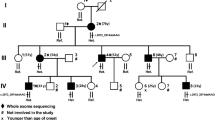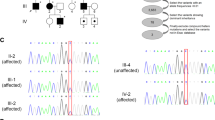Abstract
Hereditary spastic paraplegia (HSP) refers to a group of genetic disorders characterized by progressive weakness and stiffness in the muscles of the legs. To date, more than 83 types of HSP exist, differing in their etiology, their degree of severity, and the nature of symptoms associated with each of these conditions. Owing to their genetic and clinical heterogeneity, the establishment of an accurate diagnosis can be very challenging, especially with the clinical overlap observed between those conditions and other neurogenetic diseases. A 7-year-old girl, born to a consanguineous Iraqi family, was referred to us for clinical and genetic evaluation. The patient presents with progressive difficulty in walking that started when she was 3 years old, lower limb predominant spastic paraparesis, and mild upper limbs involvement with slight tremor in the hands, all occurring in the absence of neurodevelopmental or growth delays. Whole exome sequencing revealed a novel homozygous missense variation in the RNF170 gene (NM_030954.3; p.Cys107Trp), thus establishing the diagnosis of HSP. Here, we report the second missense biallelic variation in RNF170 and we discuss thoroughly all previously reported cases with RNF170-linked HSP.
Similar content being viewed by others
Data availability
The datasets used and analyzed during the current study are available from the corresponding author upon a reasonable request.
References
Warner TT (2020) Clinical and pathogenic themes in hereditary spastic paraplegia. Brain 143:2864–2866. https://doi.org/10.1093/brain/awaa278
Noreau A, Dion PA, Rouleau GA (2014) Molecular aspects of hereditary spastic paraplegia. Exp Cell Res 325:18–26. https://doi.org/10.1016/j.yexcr.2014.02.021
Elsayed LEO, Eltazi IZ, Ahmed AE, Stevanin G (2021) Insights into Clinical, Genetic, and Pathological Aspects of Hereditary Spastic Paraplegias: A Comprehensive Overview. Front Mol Biosci 8:690899. https://doi.org/10.3389/fmolb.2021.690899
Vavouraki N, Tomkins JE, Kara E et al (2021) Integrating protein networks and machine learning for disease stratification in the Hereditary Spastic Paraplegias. IScience 24:102484. https://doi.org/10.1016/j.isci.2021.102484
Eggermann K, Gess B, Häusler M et al (2018) Hereditary Neuropathies. Dtsch Aerzteblatt Online. https://doi.org/10.3238/arztebl.2018.0091
Miller SA, Dykes DD, Polesky HF (1988) A simple salting out procedure for extracting DNA from human nucleated cells. Nucleic Acids Res 16:1215–1215. https://doi.org/10.1093/nar/16.3.1215
Li H, Durbin R (2009) Fast and accurate short read alignment with Burrows-Wheeler transform. Bioinforma Oxf Engl 25:1754–1760. https://doi.org/10.1093/bioinformatics/btp324
McKenna A, Hanna M, Banks E et al (2010) The Genome Analysis Toolkit: A MapReduce framework for analyzing next-generation DNA sequencing data. Genome Res 20:1297–1303. https://doi.org/10.1101/gr.107524.110
Kopanos C, Tsiolkas V, Kouris A et al (2019) VarSome: the human genomic variant search engine. Bioinformatics 35:1978–1980. https://doi.org/10.1093/bioinformatics/bty897
Richards S, Aziz N, Bale S et al (2015) Standards and guidelines for the interpretation of sequence variants: a joint consensus recommendation of the American College of Medical Genetics and Genomics and the Association for Molecular Pathology. Genet Med 17:405–424. https://doi.org/10.1038/gim.2015.30
Lu JP, Wang Y, Sliter DA et al (2011) RNF170 Protein, an Endoplasmic Reticulum Membrane Ubiquitin Ligase, Mediates Inositol 1,4,5-Trisphosphate Receptor Ubiquitination and Degradation. J Biol Chem 286:24426–24433. https://doi.org/10.1074/jbc.M111.251983
Wagner M, Osborn DPS, Gehweiler I et al (2019) Bi-allelic variants in RNF170 are associated with hereditary spastic paraplegia. Nat Commun 10:4790. https://doi.org/10.1038/s41467-019-12620-9
Valdmanis PN, Dupré N, Lachance M et al (2011) A mutation in the RNF170 gene causes autosomal dominant sensory ataxia. Brain 134:602–607. https://doi.org/10.1093/brain/awq329
Kim Y, Kim SH, Kim KH et al (2015) Age-dependent gait abnormalities in mice lacking the Rnf170 gene linked to human autosomal-dominant sensory ataxia. Hum Mol Genet 24:7196–7206. https://doi.org/10.1093/hmg/ddv417
de Sainte Agathe J-M, Mercier S, Mahé J-Y et al (2021) RNF170-Related Hereditary Spastic Paraplegia: Confirmation by a Novel Mutation. Mov Disord Off J Mov Disord Soc 36:771–774. https://doi.org/10.1002/mds.28371
Acknowledgements
We express our deepest gratitude and sympathy to the family for their full cooperation throughout the study.
Author information
Authors and Affiliations
Contributions
EC, CM, and AM conceived, designed the study, performed data interpretation, and wrote the manuscript. All authors have read and approved the manuscript.
Corresponding author
Ethics declarations
Ethics approval and consents
Approval to conduct the study was obtained from the Institutional Review Board of the Lebanese American University, Beirut, Lebanon. Parents signed an informed consent for participation and sample collection.
Consent for publication
Parents signed an informed consent for data publication.
Competing interests
The authors declare no competing interests.
Additional information
Publisher's note
Springer Nature remains neutral with regard to jurisdictional claims in published maps and institutional affiliations.
Rights and permissions
About this article
Cite this article
Chouery, E., Mehawej, C. & Megarbane, A. A novel homozygous variant in RNF170 causes hereditary spastic paraplegia: a case report and review of the literature. Neurogenetics 23, 85–90 (2022). https://doi.org/10.1007/s10048-022-00685-6
Received:
Accepted:
Published:
Issue Date:
DOI: https://doi.org/10.1007/s10048-022-00685-6




